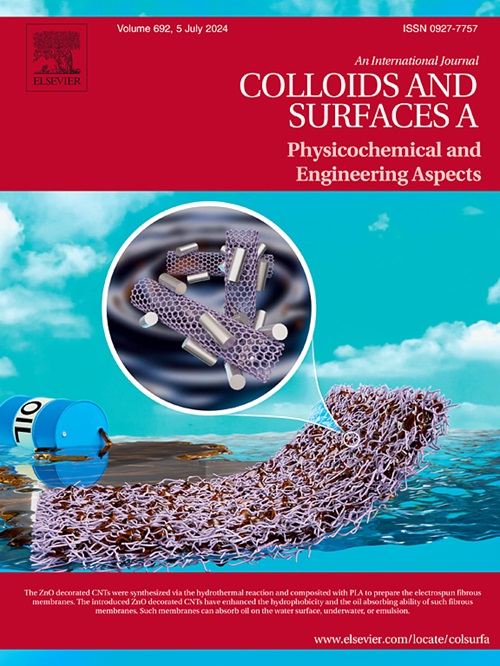High-flexibility droplet generation via centrifugal capillary array platforms with machine learning-driven dimensional precision
IF 4.9
2区 化学
Q2 CHEMISTRY, PHYSICAL
Colloids and Surfaces A: Physicochemical and Engineering Aspects
Pub Date : 2025-06-12
DOI:10.1016/j.colsurfa.2025.137466
引用次数: 0
Abstract
Droplet microfluidics has emerged as a pivotal technology in biomedical, materials, and environmental engineering due to its precise microscale manipulation capabilities. However, conventional methods relying on microfabricated channels and external pumps face limitations in dynamic adjustability, scalability, and practical applicability. To address these challenges, this study introduces a centrifugal capillary array platform (CCAP) for high-throughput, pump-free droplet generation. The system leverages centrifugal force-driven fluid dynamics and machine learning-enabled detection to achieve precise control over monodisperse droplet formation. Through integration of multifaceted parameter optimization—encompassing capillary geometry, rotational kinematics, and interfacial properties—the platform exhibits robust operational stability and tunable droplet dimensions, thereby offering distinct advantages over conventional microfluidic approaches constrained by fixed geometries and pump-induced instabilities. A deep learning-based detection framework, enhanced with Hough circle optimization, enables high-precision droplet characterization with sub-1 % measurement accuracy, establishing a foundation for closed-loop process control. The CCAP’s versatility is further validated through the successful construction of biphasic W/O and O/W systems and the synthesis of functionalized magnetic porous trimethylolpropane triacrylate (TMPTA) particles. These particles exhibit exceptional catalytic performance in degrading organic pollutants such as methylene blue, achieving rapid pollutant removal while maintaining robust recyclability. By eliminating the need for microfabrication and external pumps inherent to conventional methods, the CCAP platform delivers a scalable, intelligent, and cost-effective solution for applications including precision material synthesis; environmental remediation; and high-throughput biochemical analysis.
高灵活性的液滴生成通过离心毛细管阵列平台与机器学习驱动的尺寸精度
液滴微流体由于其精确的微尺度操作能力,已成为生物医学、材料和环境工程领域的关键技术。然而,依靠微加工通道和外部泵的传统方法在动态可调性、可扩展性和实际适用性方面存在局限性。为了解决这些挑战,本研究引入了一种离心毛细管阵列平台(CCAP),用于高通量、无泵的液滴生成。该系统利用离心力驱动的流体动力学和机器学习检测来实现对单分散液滴形成的精确控制。通过整合多方面的参数优化,包括毛细管几何、旋转运动学和界面特性,该平台表现出强大的运行稳定性和可调的液滴尺寸,从而比传统的微流体方法具有明显的优势,这些方法受到固定几何形状和泵诱导的不稳定性的限制。基于深度学习的检测框架,增强了霍夫循环优化,实现了高精度液滴表征,测量精度低于1 %,为闭环过程控制奠定了基础。通过成功构建双相W/O和O/W体系以及合成功能化磁性多孔三甲基丙烷三丙烯酸酯(TMPTA)颗粒,进一步验证了CCAP的多功能性。这些颗粒在降解亚甲基蓝等有机污染物方面表现出优异的催化性能,在保持强大的可回收性的同时实现快速去除污染物。通过消除对传统方法固有的微加工和外部泵的需求,CCAP平台为包括精密材料合成在内的应用提供了可扩展,智能且具有成本效益的解决方案;环境修复;以及高通量生化分析。
本文章由计算机程序翻译,如有差异,请以英文原文为准。
求助全文
约1分钟内获得全文
求助全文
来源期刊
CiteScore
8.70
自引率
9.60%
发文量
2421
审稿时长
56 days
期刊介绍:
Colloids and Surfaces A: Physicochemical and Engineering Aspects is an international journal devoted to the science underlying applications of colloids and interfacial phenomena.
The journal aims at publishing high quality research papers featuring new materials or new insights into the role of colloid and interface science in (for example) food, energy, minerals processing, pharmaceuticals or the environment.

 求助内容:
求助内容: 应助结果提醒方式:
应助结果提醒方式:


